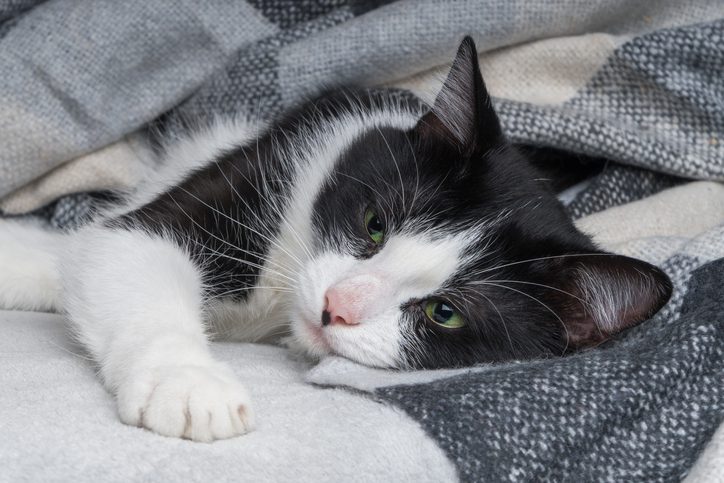UTI in Cats: Signs and What to Do
If you’re a cat owner, you may already be aware that cats are prone to developing UTIs (urinary tract infections). But if you’ve never owned a cat before or you’ve had the good luck to avoid UTIs in cats in the past, you might not be as familiar with this common cat ailment.

In the article below, we’ll explain some of the most common signs of a UTI in cats and help you learn more about what you can do to help. As always, speak to your veterinarian for more information if you have any questions or concerns about your pet’s health and wellness.
If your general veterinarian isn’t available and you think your cat may need immediate care, don’t hesitate to take your cat to the emergency vet.
Symptoms of UTI in Cats
One of the most important things to know about UTI in cats are the symptoms of this condition. By knowing and being able to identify these signs, you can make sure your cat gets the help they need as soon as possible.
Common signs of a UTI in cats to look out for include:
Straining to Urinate
If your cat goes into the litter box and seems to strain before just a little urine comes out, this is likely a UTI. Additionally, if she stands in or near the litter box and cries until she finally urinates, this may also mean a UTI is occurring.
Blood in Urine
One of the first signs most cat owners notice in their cats with UTIs is blood in the urine. Blood in the urine is almost always an indicator of a UTI, although it can sometimes mean cancer. Your vet will check your cat via bloodwork and a urine sample to determine the cause of the bleeding.
Urinating Outside the Litter Box
Sometimes, cats who have a lot of pain when urinating may mistakenly associate the litter box with their pain. If this happens, your cat may become prone to urinating outside the litter box, as she begins to think the litter box is the cause of her problems.
Licking the Genitals Often
Cats may favor licking their genitals more than is normal for their grooming needs if they are in pain related to UTIs.
Very little Urine or Too Much Urine is Coming Out
If your cat is only urinating a very little bit or, on the other hand, if she is urinating much more than is normal for her, she may be dealing with a UTI. These symptoms are also associated with other illnesses, however, so it is important to have more serious problems ruled out by your vet.
Increased Thirst
Another common sign of UTI in cats is increased thirst. Some cats may be thirstier than normal when they have a UTI, especially if they are urinating a lot more than usual.
This can also be a symptom of diabetes in cats, however, so be sure to have your cat checked by a vet right away if you notice this problem.
How to Help with UTIs in Cats
If you suspect your cat has a UTI, take her to the vet as soon as possible so she can get proper treatment. Some additional things that can help with your cat’s UTI are:
Cranberry Supplements
If your cat’s urine is very alkaline, you can balance the pH of her urine by giving her cranberry supplements. You can find these supplements as treats, pills, and mixtures that you can add to your cat’s food as well.
Cranberries can help naturally heal UTIs in cats (and in humans, too!).
Apple Cider Vinegar
Cats with urine that is too alkaline may also need to have a little apple cider vinegar in their diets. Your cat doesn’t need much of this vinegar to help balance out her urine’s pH.
Mix it with a little bit of broth (with no onions or garlic) to hide the taste, and pour it over her food for best results.
Glucosamine and Chondroitin
These supplements are usually given to cats with arthritis. However, they can help your cat’s bladder heal from UTIs and can strengthen the bladder while reducing inflammation as well.
Supplements can be given as pills or mixed into your cat’s food.
Bone Broth
Some cats may be uninterested in drinking enough water, whether they have a UTI or not. Cats are notoriously bad about not drinking enough liquids, but bone broth can help your cat stay hydrated by enticing her with a tastier option than plain water.
Vet Care
More often than not, you should take your cat to the vet for her UTI. Many cats have recurring UTIs that can be difficult to get rid of. Your veterinarian can help you figure out the best course of action to resolve your cat’s health problems moving forward.
Call Our Emergency Veterinary Team for Immediate Care for UTI in Cats
With the help of the information outlined in the article above, you should be ready to help your cat deal with a UTI. If you suspect your cat might be suffering from a UTI, look through the list of symptoms above to narrow down the possibility. If your cat checks most of these boxes, it’s time to call the vet.
Your vet can give you more information about your cat’s condition as well as what you can do to help. The vet will also tell you which medication your cat needs and what to expect with her recovery.
If your pet has a severe case of UTI in cats, or if you think they need help right away, call our emergency team at The Village Vets today! Our emergency animal hospital is open 24/7 so you never have to worry about your pet getting the care they need. Don’t wait, call our team today at (404) 371-9774 so your cat can get on the road to recovery as soon as possible.

